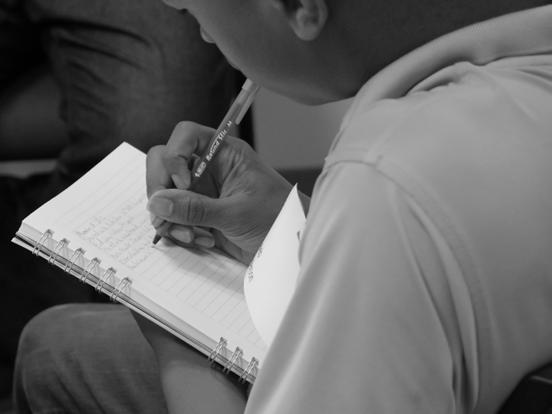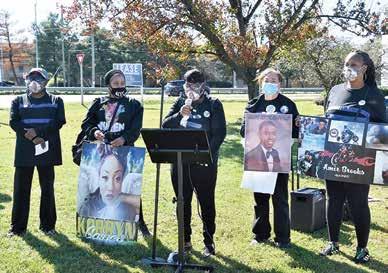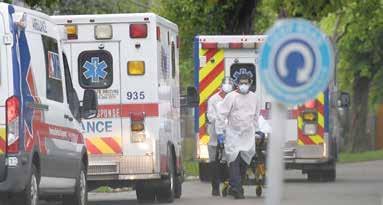
9 minute read
Education
Lawsuit Alleges Abuse of Special Needs DCPS Students
Sam P.K. Collins “When my daughter was at school, WI Contributing Writer we [always] had a problem,” Ukegbu
While District leaders continue to wear her hat, or she forgot to put on push for the reopening of K-12 cam- her jacket. There were always compuses during the COVID pandemic, plaints and [the staff] was too careless some parents, particularly those of spe- and in a hurry. At home, my daughter cial-needs students, said they’re happi- has her own time for schooling and it ly embracing all that has come with works well for her.” distance learning, including significant told The Informer. “Either she didn’t improvements to their child’s physical A LAWSUIT YEARS and emotional health. This has proven especially true for Gold Ukegbu, one of five parents who filed a civil suit in November against D.C. Public Schools (DCPS) citing allegations of abuse of her daughter and other special-needs children at River Terrace Education Campus, Walker-Jones Education Campus and Ludlow-Taylor Elementary School. “I will be one parent who advocates for homeschooling,” said Ukegbu, the mother of a non-verbal, developmentally delayed child who uses a wheelchair and suffers from a bevy of ailments, including scoliosis and aspiration pneumonia. Last March, shortly before the District-wide transition to distance learning, Ukegbu reluctantly returned daughter to River Terrace after suffering a broken femur bone and back skin injuries, all under circumstances that Ukegbu said she hasn’t been able to determine. Though school officials attributed the injuries to the negligence of a bus driver, Ukegbu said they have yet to produce an official report. She has been attempting to document the abuse and have her daughter placed in a well-regarded charter school for special-needs children since well before the start of the pandemic. Neither has happened yet, but Ukegbu said her daughter can now enjoy a routine that involves schooling, physical therapy, pediatrics and napping under the guidance of her mother and siblings. IN THE MAKING The quintet’s civil suit, filed on the behalf of their children on Nov. 22 in the U.S. District Court for the District of Columbia, outlines abuse episodes that allegedly occurred during the 2018-2019 academic year, and in the months preceding the COVID-19 pandemic. For instance, a teacher allegedly struck a student in the face at River Terrace in front of three staff members, while a nonverbal autistic youngster at Ludlow-Taylor suffered blunt-force trauma to his face. In the aftermath of their children’s injuries, Ukegbu and the other plaintiffs mentioned in the civil suit filed police reports. The reports, none of which resulted in prosecution, petitioned for charges of simple assault and second-degree cruelty to children. Yaida Ford, one of two attorneys representing the five parents, said DCPS officials had been notified through various means about the alleged use of unlawful restraints at River Terrace, Walker-Jones and Ludlow-Taylor. The suit alleges that administrators at River Terrace hadn’t taken the necessary steps to create an educational environment for disabled children that’s equitable to that of their non-disabled counterparts. That includes hiring qualified behavioral specialists and improving the manner in which administrators report on-campus incidents of abuse. “Parents are tired of having to send their kids into an unstable and unpredictable environment,” Ford said.
“When the child is nonverbal, the parent has to jump through hoops to find out what happened to them,” she added. “It says something about the state of education in the nation’s capital. You would expect D.C. to be a leader in the education of vulnerable populations. We are just as bad here, if not worse than other jurisdictions who lack our resources.”
In a statement to The Informer, DCPS declined to comment on the pending litigation but said it’s actively working with the Office of the Attorney General to address the lawsuit.
SECURING ACCOUNTABILITY
Joakima Jones, another parent mentioned in the civil suit, echoed Ford’s
LAWSUIT Page 26
5 Gold Ukegbu, one of five parents who filed a civil suit in November against DC Public Schools (DCPS) for the alleged abuse of her daughter and other special-needs children, said she’s considering homeschooling her 14 year old. (Anthony Tilghman/The Washington Informer)
ASSOCIATION FOR THE STUDY OF AFRICAN AMERICAN LIFE AND HISTORY® VIRTUAL FESTIVAL THE 2021 BLACK HISTORY MONTH

CELEBRATING THE 95TH ANNUAL BLACK HISTORY THEME The Black Family: Representation, Identity, and Diversity
Monday, February 1, 2021 FREE COMMUNITY EVENT - OPEN TO PUBLIC
Announcement of the Black History theme and Introduction of ASALH’s Inaugural Virtual Black History Month Festival
Saturday, February 6, 2021 12:00 p.m. to 2:00 p.m. EST FREE COMMUNITY EVENT - OPEN TO PUBLIC
From the Continent to the Americas: Foodways, Culture and Traditions in the African American Family
Wednesday, February 10, 2021 FREE COMMUNITY EVENT - OPEN TO PUBLIC
Presentation of the Inaugural ASALH Book Prize
Wednesday, February 24, 2021 FREE COMMUNITY EVENT - OPEN TO PUBLIC
Diving with a Purpose
Sunday, February 28, 2021 12:00 p.m. to 2:00 p.m. EST FREE COMMUNITY EVENT - OPEN TO PUBLIC
ASALH Prince George’s County Truth Branch Event Featuring a conversation with Dr. Bernice King
Sunday, February 28, 2021 7:00 p.m. EST FREE COMMUNITY EVENT - OPEN TO PUBLIC
ASALH and PBS Books Present: A Conversation with Ngugi Wa Thiong’o and Sundiata Cha-Jua
Marquee Event Saturday, February 20, 2021 1:00 p.m. to 3:00 p.m. EST (TICKETED EVENT: $50.00) Finding Our Roots in African American History
A Conversation with… Henry Louis Gates and Henry Louis Gates, Jr. Evelyn Brooks Higginbotham Evelyn Brooks Higginbotham Acclaimed for his scholarship, his documentary films about African, Afro-Latin, and African American History, and his popular television series, “Finding Your Roots,” Henry Louis Gates, Jr., has brought fascinating African American family stories to the wider public. The Black History Month Festival in 2021 is proud to feature a conversation between ASALH’s national president Evelyn Brooks Higginbotham and Henry Louis Gates, Jr., who will share his thoughts and motivations in popularizing Black History through the heritage of African American families and communities and their search for roots.
ASALH BRANCHES WILL HOST VIRTUAL PROGRAMS THROUGHOUT THE MONTH ASALH BRANCH EVENTS CAN BE FOUND AT ASALH.ORG/BRANCH-EVENTS
ASSOCIATION FOR THE STUDY OF AFRICAN AMERICAN LIFE AND HISTORY THE FOUNDERS OF BLACK HISTORY MONTH WWW.ASALH.ORG | 202-238-5910 | #ASALH #ASALHFAMILY #ASALHFAM #ASALH2021
Getting Through Grief
Submitted by AmeriHealth Caritas District of Columbia
Human beings are pretty resilient. Most of the time, we can experience a loss and then continue on with our lives. In between the loss and the time when we move on, though, we may need to grieve what’s gone. Grief helps us get through our feelings about the loss. When we grieve, we honor how we feel and start to adapt to the change. Grief is our natural and healthy response to loss.1
We can feel grief over many types of losses. Some kinds of losses may have come up for you during the pandemic. We might need to grieve the loss of a loved one, home, or job. We may feel sadness over changes in our health or our loss of social connection. We can even grieve the loss of an ideal — such as our sense of normalcy or safety.1
HOW TO MOVE THROUGH GRIEF • First, name it. Try to identify why you are feeling sadness or anger. Write down your thoughts and feelings each day. Writing about our emotions may improve our physical and mental health.1 • Accept how you feel. Grief shows up in different ways for different people. You may notice sadness, anger, or fatigue. These are all normal ways to feel.2 • Stay in touch. Support from trusted friends and family can help us move on. We can stay connected through phone calls and online hangouts such as social media.1 • Take care of yourself. Eat a healthy diet. Get the sleep you need. Grief can take energy, so it’s important to keep your body in good care.2 • If you have lost a loved one, celebrate the life they had. Set aside a time to remember and honor them with others who held them dear.2
HELPING HANDS
If you feel overcome or are having trouble moving on from grief, it may help to talk to a specialist. They can help you work through it so you can get back on track. If you are an AmeriHealth Caritas District of Columbia enrollee, call Enrollee Services at 202-408-4720 or 1-800408-7511. Or you can call the D.C. Department of Behavioral Health Hotline at 1-888-793-4357.
The information in this material is for educational purposes only. It is not to take the place of a primary care provider (PCP) or a behavioral health (BH) specialist. If you have questions, talk with your PCP or BH specialist, or visit the sources listed in this material. If you think you need to see a PCP or BH specialist because of something you have read in this information, please contact your PCP or BH specialist. Never stop or wait to get medical attention because of something you have read in this material.
Sources: 1. “Grief and COVID-19: Mourning Our Bygone Lives,” American Psychological Association, https:// www.apa.org/news/apa/2020/04/ grief-covid-19. 2. “Grief: Coping With the Loss of Your Loved One,” American Psychological Association, https://www.apa. org/topics/grief. 3. “Stress Relief From Laughter? It's No Joke,” Mayo Clinic, https:// www.mayoclinic.org/healthy-lifestyle/ stress-management/in-depth/stress-relief/art-20044456.
All images are used under license for illustrative purposes only. Any individual depicted is a model
The Laughter Medicine
#BestMe
Whether you laugh from a toddler’s antics or a TV commercial, the laughing does you good. Laughter may have many health benefits over the short and long term.3 Laughter is known to lift moods, but it doesn’t stop there. A good laugh actually produces changes in the body. Laughter may:3 • Improve body functions. It can stimulate your heart, lungs, and muscles and help you take in more oxygen from air. When you laugh, your brain also releases a hormone that increases your sense of well-being. • Relieve stress. A good laugh can briefly raise and then lower your heart rate and blood pressure. It can help your muscles relax and circulation improve. These can leave us feeling more relaxed. • Reduce pain. Laughter is thought to help the body produce its own natural painkillers. • Boost immunity. Negative thoughts can add stress to your body’s systems, which may decrease your body’s ability to fight sickness. But positive thoughts can help your body resist stress and, potentially, help your body fight illness. • Improve mood. An easy laugh may help you connect with others.
Find us on Twitter at www.twitter.com/amerihealthdc. / Find us on Facebook at www.facebook.com/amerihealthcaritasdc. / Find us on Instagram at www.instagram.com/amerihealthcaritasdc.
#BestMe Rewards Program I got a gift card for getting my annual physical. You can too.
You can get a $25 gift card if you: • Are an AmeriHealth Caritas District of Columbia enrollee • Are 12 – 21 years old • Get an annual physical exam
Visit www.amerihealthcaritasdc.com/giftcard to learn more. Note: An enrollee cannot get more than $50 in incentives each year.
www.amerihealthcaritasdc.com
AmeriHealth Caritas District of Columbia complies with applicable federal civil rights laws and does not discriminate on the basis of race, color, national origin, age, disability, or sex.

ACDC-20948820-2
All images are used under license for illustrative purposes only. Any individual depicted is a model.








